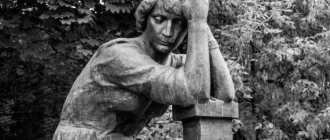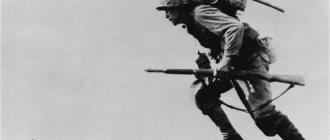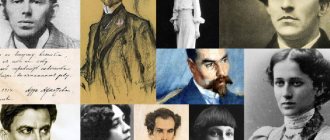- Essays
- On literature
- Tyutchev
- The theme of the homeland in the works of F. I. Tyutchev
Despite his devotion to his native land and boundless love for the Motherland, the great Russian poet Fyodor Ivanovich Tyutchev spent less time in his native land than in a foreign land. This is how the circumstances developed. However, according to the words “she has become special...”, related to her homeland, the author determined his attitude towards her. The time associated with his native landscapes in Russia remained forever in the poet’s soul.
The writer was sure that what was priceless to him (“poor villages”) remained a mystery to representatives of the Western world. Many events in history passed before the eyes of the poet. But he was always on the side of the ordinary Russian person, emphasizing the resilience of the people and their fortitude (“the native land of long-suffering…”).
The theme of the Motherland is constantly visible in his work. It also manifests itself through the image of a woman who performs backbreaking work and therefore deserves special attention from Tyutchev: “And your life will pass unseen.” The fate of the fairer sex is not indifferent to the writer. In addition, he believed that it was necessary to share the fate of his homeland in the present, and not in the past, from which only memories remained (“Their life, like a boundless ocean, is all spilled in the present”). The harsh truth often appears in creativity, which the author does not hide. However, in his opinion, this is one of the manifestations of his homeland.
One of the most striking manifestations of love and tenderness for the homeland is associated with the poet’s appeal to the nature of his native land. Thus, the extraordinary realism of the lines about a spring thunderstorm makes the reader a participant in the events (“I love a rose in early May...”). And the ability, for example, to feel how “the azure of heaven laughs” opened up enormous opportunities for him in creative activity.
The lines of Fyodor Ivanovich: “I remembered the golden time” say that “staying in his native country is the best period in his life. In the thoughts of the great poet there was not a single thought associated with choosing in favor of the West. All Tyutchev’s experiences and his condition were associated with faith and love for his homeland.
Thus, analyzing the poems of F. I. Tyutchev, we can conclude that his image of his homeland is formed thanks to his appeal to the common Russian man, to woman, nature, and also religion. In each of these elements the poet saw a soul. Therefore, he treated Russia with respect and compassion. In general, it is impossible to ignore the poet’s genuine sincerity and admiration for his homeland.
The theme of the Motherland in the works of F. I. Tyutchev
All his life, F.I. Tyutchev believed in the special purpose of Russia, in its great destiny. The fate of the poet himself was such that he spent his best years abroad. Tyutchev served for a long time in Munich, in the Russian diplomatic mission. While living in Germany, Fyodor Ivanovich visited many European countries - Greece, Italy, France. However, his thoughts were always directed towards Russia; he was “Russian in heart and soul.”
You can’t understand Russia with your mind, you can’t measure it with a common yardstick: It has become something special - You can only believe in Russia. The poet carried this faith throughout his life. “The true defender of Russia is history; over the course of three centuries, it has tirelessly resolved in favor of Russia all the trials to which it subjects its mysterious destiny,” Tyutchev wrote in the article “Russia and Germany.” For the poet, Russia is “the native land of long-suffering”, “sad places”, with a leaden sky and huge snowy plains. In Tyutchev's lyrics we encounter many beautiful, modest Russian landscapes. Here are “pale birches”, “light motherwort”, “gray moss”. Everything is so pale, sad, deathly. It seems that tired nature is sleeping, “plunging into an iron sleep.” The native landscape gives rise to sadness in the poet’s soul: ...Under the smoky canopy of a huge snow cloud the distance turns blue - with its gloomy forest, shrouded in autumn darkness... Everything is bare and empty and immense. In a mute monotony... In some places only spots of standing waters covered with the first ice are visible. (“On the way back”) Memories of the lands where there are “rainbow mountains” and “azure lakes” are still alive in his soul. However, for Tyutchev, Russia is not only sad places frozen in fatal silence. But this is also the Motherland, from which fate separated him as a young man and where he nevertheless returned many years later, as a mature man, to fulfill his true destiny. Europe did not become native to the poet. West and East have always been opposed in Tyutchev's mind. The poet’s pictures of modest Russian nature and “poor villages” are spiritual and beautiful, despite their simplicity and discreet appearance. But this beauty is inaccessible to Western understanding: The proud gaze of a foreigner will not understand or notice, What shines through and secretly shines In your humble nakedness. ("These poor villages") For the poet, this land is a land blessed by the Lord. And it was in Russian patriarchy, in Orthodox traditions, in the very makeup of the Russian soul that Tyutchev saw the guarantee of Russia’s salvation. The poet’s unconditional faith in Russia’s special path, in its special mission, is heard in the poem “No, my dwarf! an unparalleled coward!..” The poem is addressed to State Chancellor Karl Vasilyevich Nesselrode, who promoted anti-Russian sentiments in Russia. Rus', according to the poet, despite any trends of fashionable and progressive ideas, will not renounce its great destiny: What was promised by destinies Already in the cradle was to her, What was bequeathed to her for centuries And by the faith of all her kings... The crown and scepter of Byzantium are not for you will be able to deprive us! The world destiny of Russia - No! you can't block it. (“No, my dwarf! An unparalleled coward...”) Russia, according to Tyutchev, has its own special path, far from Western revolutionary ideas, riots, uprisings and coups. The poet believed that revolution was by nature alien to Russia. “Russia is first and foremost a Christian empire. The Russian people are Christians not only because of the Orthodoxy of their convictions, but also because of something more sincere than convictions. He is a Christian due to the ability for self-denial and self-sacrifice, which forms, as it were, the basis of his moral nature. Revolution is, first of all, the enemy of Christianity,” wrote Tyutchev in the article “Russia and the Revolution.” The poet perceived the revolutionary movement as an uncontrollable natural force, imbued with a demonic, satanic principle. Russia, in Tyutchev’s view, is a country of unshakable moral principles, a country of patriarchy and stability of the social order. Love for one's neighbor, kindness, justice, Christianity and mercy, courage and fortitude - these are the qualities that have long been inherent in the Russian people, which helped him withstand all historical storms, in times of unrest and enemy invasions. This is the key to the greatness and vitality of Russia. Waves of the frantic surf, The sea continuously rolled with a roar, whistle, squeal, howl, Beats into the coastal cliff, - But calm and arrogant, Not overcome by the foolishness of the waves, Motionless, unchanging, Modern Universe, You stand, our giant! This is what Tyutchev wrote in the poem “The Sea and the Cliff.” Stormy sea waves here personify the Western revolutionary movement, while the cliff represents the inviolability of autocratic Russia. It seems that the poet was mistaken in his prophecy, and at the same time unusually accurately and correctly predicted the future of Russia. Having gone through riots, wars and revolutions, Russia still did not change itself, returning to its origins and eternal values - to Christianity and mercy, kindness.




